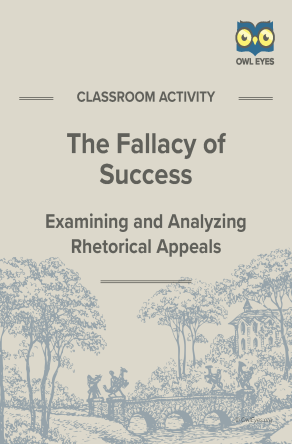The Fallacy of Success Rhetorical Appeals Worksheet
- 0 page
- Subject: Ethos, Logos, Pathos, Rhetorical Devices, Lesson Plans and Educational Resources
- Common Core Standards: RI.11-12.3, RI.11-12.5, RI.11-12.6, RI.11-12.9, RI.9-10.3, RI.9-10.5, RI.9-10.6, RI.9-10.9
- Grade Levels: 9, 10, 11, 12
Product Description
G.K. Chesterton published “The Fallacy of Success,” one of his most influential essays, in his 1909 collection All Things Considered. In the essay, Chesterton attacks with great relish the rise of books and articles about “Success.” To Chesterton, the type of success promoted in these works is a phantom, too abstract to serve as a genuine goal or offer any practical advice. Moreover, the pursuit of success, exemplified by such titans of industry as Vanderbilt and Rothschild, is a corrupt moral aim. In arguing the vacuousness and vileness of “Success,” Chesterton makes use of Aristotle’s three classical rhetorical appeals of ethos, pathos, and logos.
Skills: analysis, close reading, drawing inferences from text, examining the impact of diction on audience
About This Document
The Owl Eyes Rhetorical Appeals activity gives students an opportunity to practice examining and analyzing the Aristotelian rhetorical appeals: ethos, pathos, and logos. Students will analyze selected rhetorical appeals from the text to determine which appeal they best represent and explain the appeal’s impact. The main components include the following:
- A brief introduction to the text
- A detailed handout on rhetorical appeals
- A list of tips for spotting rhetorical appeals
- A step-by-step guide to activity procedure
- A detailed answer key for teachers
In completing this worksheet, students will be able to examine and analyze Aristotle’s three rhetorical appeals in order to evaluate works of rhetoric and the techniques they employ.







